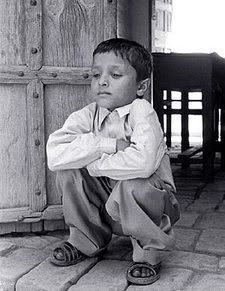Roshan Malik and Adil Najam
 (Note: I post this today from Paris, France; a place that celebrates this date – May 1, Labour Day – quite seriously. This post was first carried at ATP in September 2006, but it is still relevant, especially in the context of child labor, and deserves more attention this Labor Day. AN).
(Note: I post this today from Paris, France; a place that celebrates this date – May 1, Labour Day – quite seriously. This post was first carried at ATP in September 2006, but it is still relevant, especially in the context of child labor, and deserves more attention this Labor Day. AN).
Yeh Bacha Kis Ka Bacha hai (‘whose child is this?’) is the title and the refrain line from a famous poem by Ibn-i-Insha. Most people know Insha for things like ‘Insha ji utho, aab kooch karo’ or ‘kal chodhweiN ki raat thi’ or ‘yeh baataiN jhooti baataiN haiN’. In fact, most people would not think of ‘yeh bacha kis ka bacha hai’, with its characteristically Insha simplicity, the greatest work of the poet, columnist and humorist. It is, however, a moving piece that Insha ji had written upon seeing the photo of a starving Ethiopian child during the devastating famine of the seventies.
However, a new video rendition this poem just released by the advocacy group Actionaid Pakistan, and directed by Matteela, has not only done amazing justice to the poem but has uncovered layers upon layers of emotive meaning that may have been missed by too many readers.
Even if you read and see nothing else on this site, we urge you to view this short video rendition, and to think deep and hard about both the words and the images. Click on arrow at center, or view it directly here:
There is some wonderful information about the song at Matteela’s website, including this:
Astafila is the name of the inimitable girl who opens the video and it is also her voice in the background… Younis a.k.a Kaka, is our angry balloon selling protagonist but the voice in the background is that of Waqas, a student at a madrasah in Lahore’s Samanabad area. Kaka’s casting was done much before any work had begun on the song or the video. He was spotted at the mini golf course in Lahore’s St. Mary’s Park where he works in the evenings… The plaintive taan of Malkauns in the background is that of Uruj Saami… The tinkly piano in the background is the handiwork of Riaz Hans who also plays the tabla. The beat which structures the song is from a Morcheeba song.
 We hope you will remember the poem but this post is really about the subject of the poem and of this video. The subject of the state of children in Pakistan.
We hope you will remember the poem but this post is really about the subject of the poem and of this video. The subject of the state of children in Pakistan.
The disparity between haves and have nots is widening rapidly in urban areas of Pakistan. These vulnerable street children sometimes involve into the criminal activities and are destined to face the juvenile trial. In Pakistan, more than 4000 children under the age of 18 are facing juvenile trial in the courts.
The miseries of poor children in Pakistan are quite similar with other South Asian countries. UNICEF reports that more than 3.6 million children under the age of 14 are working under hazardous and exploitative conditions in Pakistan. It also says that child abuse cases reported in Pakistan during 2000-04 were more than 17000.
 Pakistan is signatory of UN Convention on Rights of the Child (CRC) and other ILO Conventions and its national policies condemn child labor and forced labor, but the situation on ground is different. We have domestic child labor, child labor in informal settings like children working in workshops, washing cars in the streets, working on restaurants, begging, child trafficking and rural sector child labor etc.
Pakistan is signatory of UN Convention on Rights of the Child (CRC) and other ILO Conventions and its national policies condemn child labor and forced labor, but the situation on ground is different. We have domestic child labor, child labor in informal settings like children working in workshops, washing cars in the streets, working on restaurants, begging, child trafficking and rural sector child labor etc.


















































I am Mazdoor
I am Mazdoor
And I have audacity of hope
Until I make my brother understand
That the land of Jinnah is abode
of equity and justice and more.
Equity (equity)
Justice (justice)
Thank you Helen Reddy for inspiration.
There are two responses of Pakistani origin to the injustice to the mazdoor. First is the famous “anthem of the gharib” of the Great Allama, “uTho meri dunYa kay ghariBoon ko jaGa do”. This, while stirring, has an extreme prescription. I personally think the Great Allama is not prescribing but brings attention to proscribe. An outcome to avoid at all costs.
The other is that of Faiz, “hum daKhay gay”. This accepts the present and postpones the response for another Day.
But can work today to make this a better world?
Yes.
And for that we turn to Jinnah as expressed in words of Jagan Nath Azad.
Daulat hai apne mulk key bay’hudd-o-bay’hisaab
Hon’gay hum aapp mulk key daulat say faiz’yaab
The country’s wealth unlimited and boundless
We will all be blessed by the wealth
I have the audacity of hope, with fierece urgency of now!